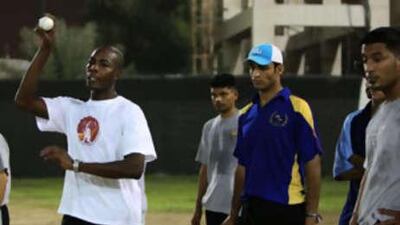DUBAI // Vasbert Drakes believes UAE cricket must go professional if it is going to compete consistently at one-day level. The Emirates are best placed to profit if the Asian Cricket Council are successful in their bid to gain full ODI status for one more of their members within two years.
They have been the most successful Asian country outside of the four Test sides on the field, and also have stadia which are the envy of most nations. However, the prospect of trying to beat the world's best sides on a regular basis would put a strain on finances. The temporary UAE coach Drakes believes players will need to be professional if they are realistically going to compete. "It would be an absolutely great opportunity if the UAE came on board [in the one-day international sphere]," he said.
"They would definitely need to embrace the idea of becoming a professional unit. At the end of the day, for an organisation to function at its best there needs to be a steady cash flow, and the role of the stake-holders is imperative." Drakes, who is serving as the UAE boss during the off-season from his duties as Barbados coach, cites the influence of Allen Stanford in West Indies cricket as to how the private sector can assist the game.
The money the Texan billionaire has invested in recent years, primarily via his cash-rich Stanford 20:20 competition, has made cricket a viable career option for far more players in the Caribbean than in the past. Drakes said: "Stanford has come on board in the West Indies, and now people see cricket as a job, not just as a sport. "If it is their job they can harness these skills and work on them 24-7. In the past, finance was lacking, but Stanford has pumped in more money, which has benefitted the game."
The Emirates Cricket Board are about to benefit from a massive cash windfall in the form of a handout from the International Cricket Council. They are planning to use some of those funds to develop the sport among native Arabs, as well as setting up scholarship schemes for talented youngsters. However, it is unlikely their slice of the TV deal pay-out would stretch to allowing their players to become professional.
The UAE's squad for the recent Asia Cup, where they were soundly beaten by the two full members Sri Lanka and Bangladesh, was made up of store-keepers, cabin crew and schoolboys. Drakes added: "If you look at the way first-class cricket and Test cricket is played, all the guys are fully-professional. They eat, sleep and drink cricket. "Our guys are professionals in other jobs, they come because they are passionate about the game.
"They can only really train between 7pm and 9pm. It is impossible for them to be professional cricketers when they can only train for two hours a day. "I take my hat off to them. They show a lot of passion and determination. "I think these guys have the ability to play at the highest level. It is like anything else - the more you practice, the better you get. "It is difficult to judge this side on one-off occasions [like at the Asia Cup]. You didn't see the best of the captain, Saqib Ali in Pakistan.
"The more experience these guys get at that level, I am sure you will see an improvement. They would not embarrass themselves." In a bid to source talent more accurately, Drakes returned to the playing field himself this week. The former West Indies Test all-rounder, who retired in 2005, has played three matches for the ECB Blues side in the ongoing Rosy Blue Twenty20 Summer Tournament in Sharjah.
The side is made up of most of the players he coaches in the UAE national team, while the 38-year-old Drakes has bolstered their attack - though not by his usual means Drakes was a feared fast-bowler during his professional playing days, but he has been mostly bowling some sedate off-spin in the Sharjah competition. "I hadn't picked up a bat or a ball in quite a while," he said. "I was keen to get out on the field and I also wanted to get a better insight into what sort of talent is about."
pradley@Thenational.ae


